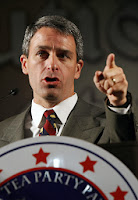Yesterday, Democrats across the Commonwealth herded to churches, elementary schools, and all manner of polling places to choose the rest of Terry McAuliffe's ticket.
Ralph Northam's hard swing to the left paid off, he should probably send a thank you card to E.W. Jackson for a
very nice push near the finish line. Jackson's questioning of Chopra's knowledge of the now-infamous Federal PRISM program was an important step to defeating the former Federal Chief Technology Officer. Jackson's recent ad slammed Chopra for his ties to the Obama administration and the proverbial scandal fountain that has erupted at the White House in recent weeks.
Jackson may have uncovered a key advantage here, knocking Chopra based on his Washington past. Virginia voters showed a bias (
the correct one, I would argue). They are suspicious of ties to big greasy Washington politics. They're worried about the tactics that those federal ties bring into the election.
Of course, knowing that, their choice for a gubernatorial candidate now makes zero sense.
Instead, Dems turned to a pair of state senators. Northam's no fed, but he did have to swing pretty far to the left to convince some skeptical money-trees on the left (see: Planned Parenthood and the Washington Post) that he will be a photo-negative of the conservative GOP ticket this year.
Mark Herring edged out prosecutor Justin Fairfax, even in his home county (
insert pun here) for the AG nod as well. Herring, a Loudoun native, was not expected to carry
Fairfax County, which was by and away the largest voting force in this election, covering almost fifteen percent of the total votes in the race. But he took it by a pretty comfortable 1,564 votes.
Yesterday showcased a bit of the sweat that Dems are putting on the Lieutenant Governor's office in this election particularly. Northam presiding over the split senate could be the last ray of sunshine to Dems fed up with the solidly red House and the prospect of Ken Cuccinelli behind the desk of the Governor.
But the real mystery of the Democratic primary...where were they? Turn-out at primaries is generally low thanks to an apathetic populace, but state-wide less than 140,000 votes were cast in the
Attorney General contest. That's roughly two and a half percent of Virginia's registered voters.
The LG race only came in a few thousand higher.
Where are the blue tides that Obama rode to victory last year? Have their dreams of hope and change abated? Are they inclined to reasonable thought now that they know their fearless leader listens to their conversations too? Are the Dems fed up with their choices? Either way, an apathetic and divided Democratic party can only mean good things for Cuccinelli, Jackson, and Obenshain in the fall.
VA GOP Caucus
vagopcaucus.blogspot.com



